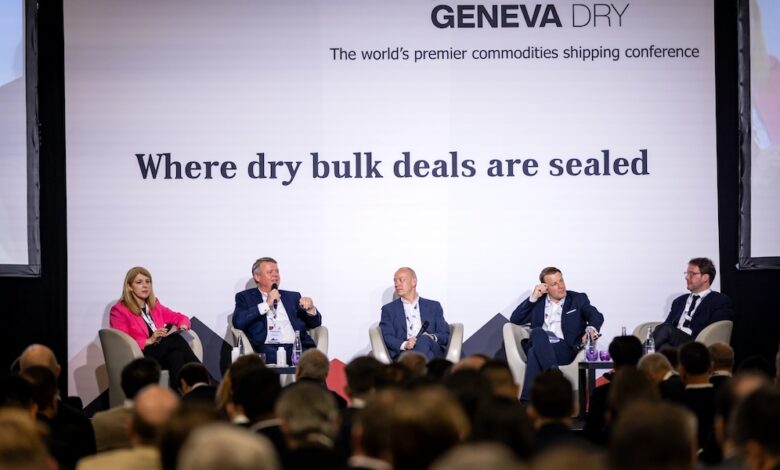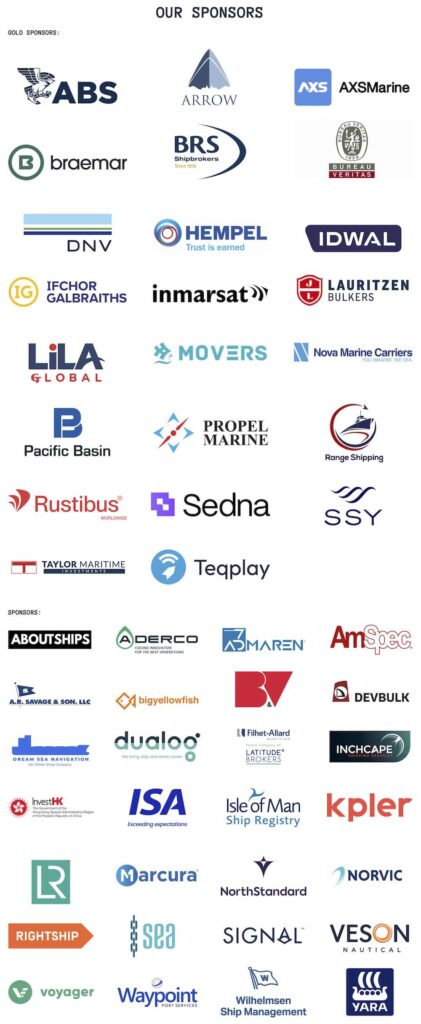‘Shipping is really about pricing risk’: Agri-commodities session at Geneva Dry

Handling risk formed much of the discussion during the agri-commodities session at Geneva Dry earlier this month, moderated by Maryana Yarmolenko Stober, associate general counsel at grains giant ADM and president of WISTA Switzerland.
Kicking off proceedings, Alex Haubert, former head of ocean freight at Brazilian soybean giant Amaggi, quoted from a book penned by supply chain guru, Martin Christopher, noting companies do not compete, but supply chains do.
“When you look at grain freight in general and the overall supply chain is is exactly what it is, it’s not that ADM competes with Bunge, with Cargill… It’s just that their supply chains compete against one another, and each company manages the business in a different way,” Haubert said, setting the scene for an insightful hour’s deep dive into the intricacies of the grain trades.
Focusing just on Chinese soybean demand, Haubert told delegates how the People’s Republic had gone from importing 3m tonnes a year to more than 100m tonnes this century.
“As soon as you have such high volumes, you also have a supply chain that is more fragile,” he warned.
“Shipping is really about pricing risk,” said Jan Rindbo, CEO of Danish shipowner Norden, getting into the heart of the ensuing discussion. Climate risk – not just decarbonisation, but weather disruptions – is especially important, Rindbo said, as the session discussed weather sensitive cargoes and problems brought about by droughts and floods.
The use of data could help shipping better handle risk. However, the Norden boss cautioned: “Since we are still as an industry still largely an analogue industry, there’s still a lot of ground for us to cover as an industry on getting a little bit more sophisticated in terms of how we manage that risk.”
This year alone, there’s a prediction of around 635m tonnes of grain exports, according to Jason Martinet, head of dry freight at Montfort Trading. While grains might account for 25% of all demand for panamax bulkers, when it comes to tonne-miles that figure shoots up to 60%, Martinet said.
“There’s a lot more time at port. So getting it wrong and pricing it wrong is a very, very costly exercise,” Martinet said.
Operators do take too much risk, Haubert said, given that freight is typically only 5% to 7% of the overall cost of the commodity, a figure that had recently risen to 9%.
“Risk is good if you understand how to price it, it gives you a competitive edge compared to others,” argued Norden’s Rindbo. “The better you know that business, maybe the better the margin is going to be. If there is no risk, everybody can price it.”
Martin Fruergaard, CEO of Hong Kong’s Pacific Basin Shipping, maintained that the sector was still very much a people business, and the industry was still struggling to harness data.
“The problem is not really data we have, you know tonnes of data, but it’s really getting that data organised so that the people that are making decisions can actually use it, and then, of course, you need to have a culture in your company where actually people want to use it,” Fruergaard said.
Turning to geopolitics, a constant theme throughout most sessions at the two-day event, Rindbo said the days are gone where the sector was just a pure supply/demand analysis to try and predict markets.
The geopolitical landscape means that shipping is becoming more inefficient, Rindbo told delegates, describing how the industry had gone from a time where one uniform global fleet could trade almost everywhere to one where the world fleet is divided up into blocks. All these disruptions mean more ships are needed, and yet there are limitations with global shipyard capacity, he observed.
Similarly, regional environmental regulations are fracturing the global fleet with Rindbo noting that the most modern, economical ships are increasingly focused on trades involving Europe, often leading to longer ballast legs.
“I think we as an industry have been under investing somewhat in ships,” admitted Pacific Basin’s Fruergaard. The problem he – and his peers – face now are the high prices at yards and all the ongoing uncertainties surrounding green fuels. Pacific Basin has not bought ships for a while, he admitted, preferring to invest instead to invest in share buybacks.
This then prompted a question from the audience on why the owners on stage weren’t buying more into FFAs to spread their risk rather than simply buying back shares.
“We are doing some FFA trades because actually I think there is some value in that but we’re also buying back our shares because if you can buy back your shares at below a price of the implied price of the ships that you own, then that is also good value,” replied Rindbo from Norden, who then reminded the audience of the theme of Geneva Dry – ‘where dry bulk deals are sealed’.
“There are a lot of great deals out there at the moment, so it’s just about finding them and executing them,” Rindbo said, while admitting there is now a wide disparity between asset prices and earning capacity.
Geneva Dry, the world’s premier commodities shipping conference returns on April 28 and 29 next year with delegate passes being limited to just 800. Tickets are now on sale here.

